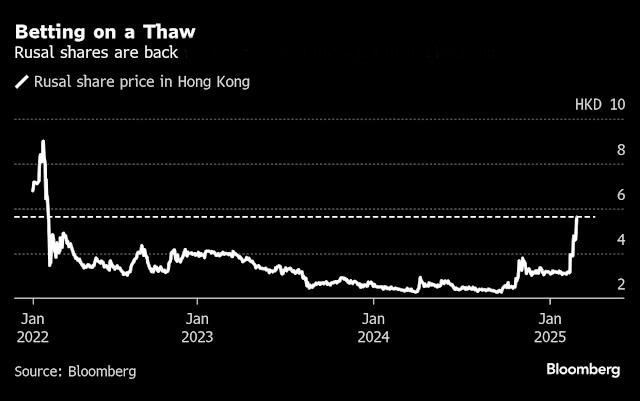
Investors are buying all kinds of assets with a link to Russia, Bloomberg reports.
As speculation swirls that the re-opening of Russian financial markets is perhaps just weeks away, the desire to get in early means that for some is just a call to find a workaround.
So they’re turning to the Hong Kong market and snapping up shares listed there of United Co. Rusal International PJSC, the Moscow-based aluminum giant, at such a fast clip the price has jumped some 75% this month. In Vienna, they’ve bid up shares of Raiffeisen Bank International AG, an Austrian bank with a Moscow-based subsidiary, by 35% this year; and in Budapest, they’ve sent OTP Bank Nyrt, which still has operations in Russia, up 11%.
It’s the same in currency markets. Kazakhstan, a major Russian trading partner, has seen the tenge strengthen about 4% this month, one of the biggest increases among currencies around the world.
That money managers are buying up anything that has even a tenuous link to Russia is a sign of how anticipation is building as President Donald Trump rushes talks to end the war in Ukraine, and just how isolated the country has become from Western finance. While US officials have floated the possibility that Russian sanctions relief could be part of a peace deal, it’s still just one part of a complex web of restrictions.
Many investors caution against reading too much into market moves in a handful of speculative assets. It’s far from clear how sanctions could be lifted, given that some of the restrictions are codified into US law and need Congressional approval before being removed. There’s also the question of European sanctions, which are likely to remain.
Within Russia’s walled-off markets, stock prices and trading volumes are also surging. The ruble has soared 15% versus the greenback since the beginning of the year, making it the best-performing currency.
But trading in those assets is only accessible to locals and investors from so-called friendly jurisdictions that don’t have any sanctions against Russia, such as the UAE and Kazakhstan.
Before the war, foreign investors had around $150 billion in Russian stocks and government bonds, and the assets were a major component of most emerging-market indexes. Most of that money has since been pulled out or become trapped in non-resident bank accounts in Moscow.
Gyorgy Palfi is a money manager, who ran a Russia-focused fund that’s since been frozen. In his current role as head of equities at VIG Asset Management Hungary, he’s buying shares in banks including Raiffeisen and OTP — two European lenders still doing business in Russia.
In the case of Raiffeisen, which has been trying to sell its Russian unit for years, the bank has accumulated more than €4 billion ($4.2 billion) in excess stranded capital. “It would be very favorable for Raiffeisen to be able to get that profit out,” Palfi said.
read more in our Telegram-channel https://t.me/The_International_Affairs

 11:53 04.03.2025 •
11:53 04.03.2025 •






















